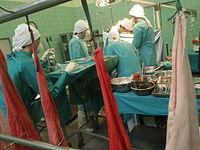
Photo from wikipedia
Background General surgery residents may be underprepared for practice, due in part to declining operative autonomy during training. The factors that influence entrustment of autonomy in the operating room are… Click to show full abstract
Background General surgery residents may be underprepared for practice, due in part to declining operative autonomy during training. The factors that influence entrustment of autonomy in the operating room are unclear. Objective To identify and compare the factors that residents and faculty consider influential in entrustment of operative autonomy. Methods An anonymous survey of 29-item Likert-type scale (1-7, 1 = strongly disagree, 7 = strongly agree), 9 multiple-choice, and 4 open-ended questions was sent to 70 faculty and 45 residents in a large ACGME-approved general surgery residency program comprised of university, county, and VA hospitals in 2018. Results Sixty (86%) faculty and 38 (84%) residents responded. Faculty were more likely to identify resident-specific factors such as better resident reputation and higher skill level as important in fostering entrustment. Residents were more likely to identify environmental factors such as a focus on efficiency and a litigious malpractice environment as impeding entrustment. Both groups agreed that work hour restrictions do not decrease autonomy and entrustment does not increase risk to patients. More residents considered low faculty confidence level as a barrier to operative autonomy, while more faculty considered lower resident clinical skill as a barrier. Improvement in resident preparation for cases was cited as an important intervention that could enhance entrustment. Conclusions Differences in perspectives exist between general surgery residents and faculty regarding entrustment of autonomy. Residents cite environmental and attending-related factors, while faculty cite resident-specific factors as most influential. Residents and faculty both agree that entrustment is integral to surgical training.
Journal Title: Journal of graduate medical education
Year Published: 2021
Link to full text (if available)
Share on Social Media: Sign Up to like & get
recommendations!